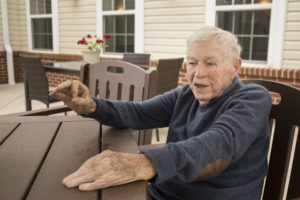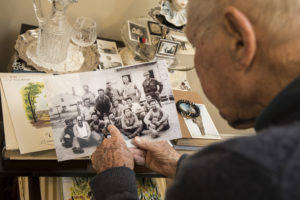UCC’s Phoebe Ministries Resident Reminisces About ‘Stories Told, Secrets Kept’ in Journalism Career

Frank Lordan, a resident at UCC-related Phoebe Richland in Upper Bucks County, Pa., talks about serving as a journalist and serving in World War II.
As a journalist in the newspaper business for 40 years, Frank Lordan’s motto has always been, “The most important thing is your honesty, integrity, and ability to keep a secret.” Some secrets are still important to keep today, although he has been retired from The Philadelphia Inquirer since 1988. Other secrets it was his job to report — most importantly, stories from the McCarthy era, when innocent people were being tried as suspected communists.
Frank Lordan currently lives in the United Church of Christ-related Meadow Glen Personal Care Community at Phoebe Richland, not far from his relatives in Upper Bucks County, Pa.; he spends much of his time outdoors in the pastoral setting around Richlandtown, Pa. Accustomed to dining with the culinary kings of the Philadelphia restaurant scene, Lordan enjoys the local upscale restaurants and continues to be a voracious reader, with daily subscriptions to The Philadelphia Inquirer and The New York Times.
‘My Greatest Accomplishment’
“I consider being a journalist my greatest accomplishment,” reflects Lordan. “I really liked being able to right some wrongs … just by putting words on paper. It was good sometimes to be a voice for the voiceless.” In 1954, the Monmouth New Jersey Democratic Committee and Americans for Democratic Action honored Lordan with an award for his reporting on the McCarthy hearings in The Long Branch Daily Record. The Four Freedoms Award was given at the club’s annual Roosevelt Day dinner; that year the award was presented to Lordan “in recognition of a series of articles on the Fort Monmouth probe and represented the best traditions of American Journalism.”
Lordan says he received help from a contact at a famous paper that was also chronicling the hearings. “The New York Times took me in and opened up their library to me,” he says. He was telling the story from the side of the accused, and received letters and phone calls in which he was also accused of being a communist.
Sen. Joseph R. McCarthy centered his search for espionage around the Army’s Signal Corps Laboratories at nearby Fort Monmouth. Forty-two Federal employees were suspended by the Army in 1953 and labeled security risks. “The whole country was in the thrall of McCarthy,” Lordan remembers. “With the help of myself and about a half dozen other guys, there was a series of stories which helped to acquit each and every one of the 35 scientists. Some of the so-called ‘reasons’ for their arrest included membership at a communist youth club at the age of 12, taking part in a 1935 May Day parade, and favoring policies of a particular newspaper columnist.”
Despite the difficult cult social and political situation at the time, Lordan says he has no regrets. “I was able to spend my working life doing what I knew was my purpose for living. Not everyone can say that.”
WWII Experience Shapes Later Career

Lordan reviews an old photo from World War II.
The Philadelphia native became a journalist after attending Temple University on the GI Bill. He had been drafted in 1944 when he turned 18, boarding an unheated train from Fort Indiantown Gap, Pennsylvania, to Georgia’s Camp Gordon, and then later on to Fort Jackson in South Carolina.
The uniform Lordan was given at Camp Gordon was too large, and Lordan recalls a joke his captain made at this: “When everyone is at attention, Lordan is at ease.” Lordan was required to take part in a skills assessment on the rifle range at Camp Gordon; though he had never fired a gun before, he scored highest out of 500 men.
Lordan — who had only recently been a trade school student — was assigned to the 317 Field Artillery Battalion as an ammunition corporal operating a new piece of equipment called a proximity fuse. (In General Patton’s opinion the proximity fuse won the war.) The technology was so classified he was not allowed to tell friends or family members what he was doing during the war, for fear that the information might get into the hands of the enemy. “An artillery officer in a church steeple would identify what they wanted to hit and radio back the coordinates,” Lordan recalls. “I would put the shell in the proximity fuse and it would lob it four or five miles away and spray the whole area.”
When Lordan finally arrived in Europe, Patton’s army was moving in quick pursuit of the Germans, and the war ended shortly after. Following the German surrender, a river of displaced persons streamed through the Rhineland. Lordan’s unit found a Polish woman near Koblentz in Western Pomerania (seven miles from the newly annexed Polish border) whom the Nazis had captured and left as they had retreated. The Army gave her a job in their kitchen and looked after her. “She was just wandering around,” Lordan remembers. “We adopted her.”
Though the war had ended, there was still much to do and Lordan was assigned as a mail clerk for five companies. “I stepped out of a house where my unit was staying and was struck by a truck driven by a German,” he says. The incident left him with a serious injury and hospital stays in Europe and the United States that totaled three months. Lordan believes he was spared additional injury or even death because he was destined for a different fate. “I am alive for a reason,” he says. “That reason is journalism.”
He spent 40 years living for that reason. At 91, Lordan reflects on his years in the newspaper business in New Jersey and Philadelphia, meeting famous and powerful people, reporting on Philadelphia City Hall, and breaking stories on scandals that would find their way into history books. The work was difficult, the hours erratic, and the pay was not the best, but Lordan is proud of the quality of his work, which in its way changed the world as he knew it.
This story appears courtesy of The Phoebe Messenger, © 2017-2018 Phoebe Ministries.
Join Our Mailing LIst
"*" indicates required fields
